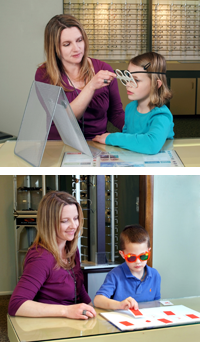Pediatric Vision Care - The Key to a Child's Learning Abilities!
Did you know that 80% of what we learn in life is done
through our eyes?
It is important to
have your child's vision assessed early. The American Optometric Association
recommends children receive a comprehensive eye exam at the ages of 6 months, 3
years, and 5 years. After entering school, their vision should be evaluated on
a yearly basis. Strabismus (eye turning) and amblyopia (poor vision out of one
eye) are two examples of conditions that can be treated much easier if
addressed early on.
Vision is more than 20/20
Vision is much more
than just being able to see the 20/20 line on an eye chart. There are many
factors that
 contribute to vision, including: contribute to vision, including:
- Ocular health (are there any
problems affecting the eye's ability to see)
- Refractive error (needing
glasses)
- Binocular vision and
alignment (being able to use both eyes together effectively)
- Eye movement skills (skilled
up and down movements or tracking)
- Accommodation (being able to
focus the eyes back and forth from distant objects to near objects), and
- "Higher order"
visual skills (what becomes of the information once it's 'seen' by the
eyes and then processed by the brain)
All of these
elements need to be considered when evaluating a child's visual abilities,
especially if he or she is having difficulties related to learning. A child may
experience many visual problems but have no idea that how they're seeing is not
normal. They may be able to see 20/20 on a school chart, but reading may be
slow and difficult, often losing their place and skipping words or lines. They
may even get headaches or sore eyes after reading for only a short period of
time. Another telltale sign may be when he or she covers one of their eyes
while performing various tasks. These are all examples of how a child's vision
may affect their ability to learn.
Assessing and
managing these types of difficulties is best done by a pediatric Optometrist
who is trained and certified to do so. We are fortunate to have on staff Dr. Chatwin who is highly trained to assess not only how your child sees
but also how he or she processes the information after it's been seen by the
eyes. Dr. Chatwin will initially conduct a thorough exam on your child's eyes so
that any health related or refractive issues affecting their vision can be
addressed. Following the comprehensive exam, he will assess your child's
binocular and accommodative skills, so that any underlying eye teaming and
focusing difficulties can also be managed. Finally, Dr. Chatwin will conduct a
visual perceptual evaluation to uncover any deficiencies in visual processing
and to reveal patterns suggestive of dyslexia (disturbance in the ability to
read) or dysgraphia (deficiency in the ability to write). In many cases, Dr. Chatwin will also recommend pycho-educational testing (cognitive / achievement) in
order to address a child's entire learning profile and provide a setting in
which they thrive academically.
Once all the areas
of difficulty have been determined, a specific vision therapy program can be
designed for a child to help them build visual skills that may be deficient and
teach them strategies enabling them to be more comfortable in an academic setting.
Therapy programs will typically include both in-office and at-home elements
|